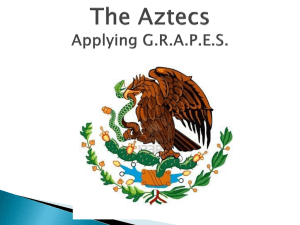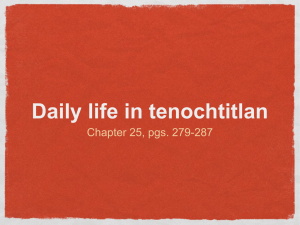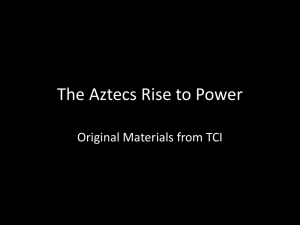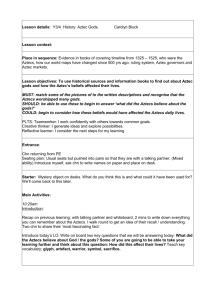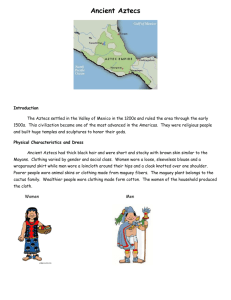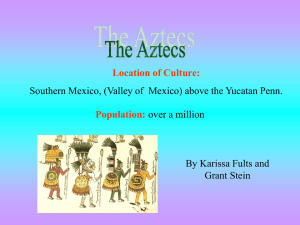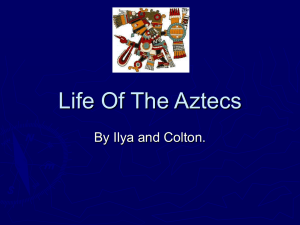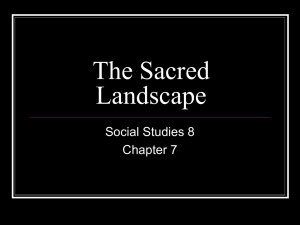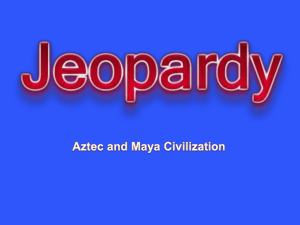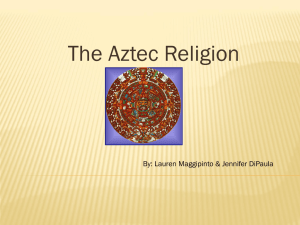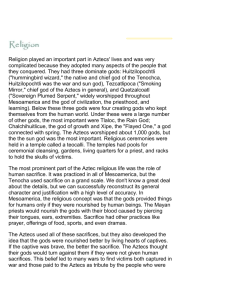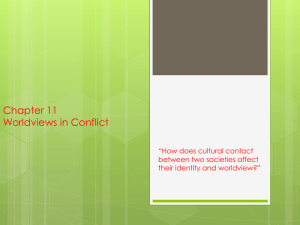The People of the Sun
advertisement
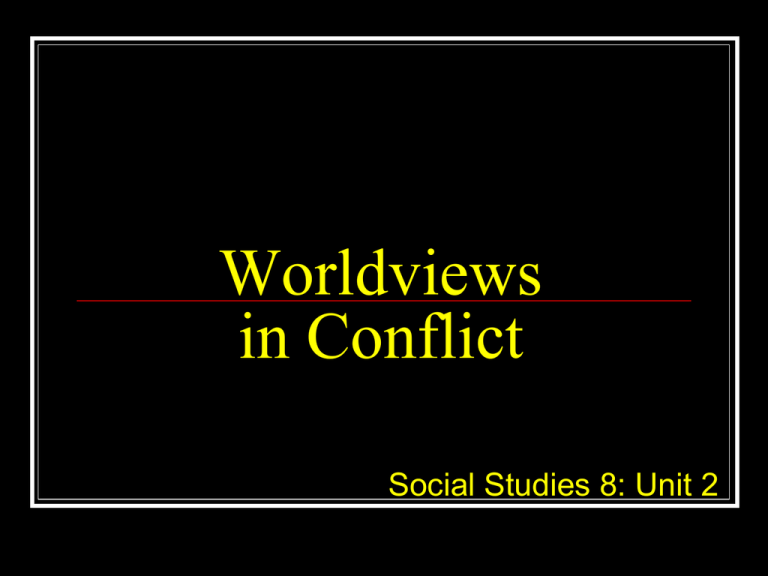
Worldviews in Conflict Social Studies 8: Unit 2 Introduction Turn to page 148 Examine each image carefully and read the captions for each one. How does each image depict the contact and mixing of different worldviews? The People of the Sun Social Studies 8: Chapter 7 The People of the Sun Turn to page 151 Read the story in the light blue box What effect do you think the hardship wandering might have had on the Aztec people? What other story do you know that is similar to this? The People of the Sun Our Inquiry Question for this chapter is… In what ways do a group’s collective beliefs and experiences contribute to shaping a unique identity? The Physical Landscape The inquiry question for section 1, “The Physical Landscape” is… How might a society’s worldview influence its ability to adapt to the physical geography? The Physical Landscape What do you think of when you see the mountains? What feelings do you have? Your worldview, attitudes, and knowledge shape how you respond to the physical geography around you. The Physical Landscape The Aztecs saw mountains as sacred or holy sites. The height of a mountain was believed to bring a person closer to the gods. So for the Aztecs the world consisted of both physical and sacred landscapes. Not surprisingly the Aztecs built their temples to resemble mountains. The Physical Landscape The land the Aztecs settled in was a swampy island in a shallow, salty lake. But the Aztecs believed they were sent there by their god, so they were determined to survive. The Physical Landscape Examine the map on page 152. Pay special attention to the elevation guide in the lower left corner. How is the location of the Aztec home connected to their religious beliefs? The Physical Landscape The power of mountains Mountains provided security They also allowed flash floods And often prevented rainfall Solution: The Aztecs built a dam at one end of their lake to control the water level and an aqueduct to bring a constant flow of fresh water into the city. The Physical Landscape An Island Home The Aztec built their city (Tenochtitlan) on Lake Texcoco. This provided excellent protection from enemies. Turn to page 154 and read the “Zoom In” section. The Physical Landscape Changing Geography Examine the map on page 155. Identify the changes to the physical landscape that were made by the Aztecs. Why would they do this? What advantages were there? Expanding the Empire Why did the Aztec’s sacrifice humans? What did the Aztec’s believe about the world and the location of Tenochtitlan? Why did they build temples? What did they trade? What did they achieve through trade? Aztecs and Human Sacrifice Killing another person as a sacrifice had a deeply religious significance. It was an expression of their devotions to the gods The victim’s blood nourished the gods. If there was no blood the gods would grow sick and die, the world would come to an end. War was important to the Aztecs because it gave them the opportunity to capture new victims to sacrifice. The early Aztec economy consisted of a type of barter system as this was a pre-capitalist society. Minor purchases were made with cacao beans imported from lowlands. What would the following have been worth: a small rabbit? an egg a large piece of cloth In the marketplaces, a small rabbit might have been worth 30 beans, an egg cost 3 beans while larger purchases of cloth could range from 65 to 300 cacao beans. Read page 165-166 Why would the expanding Aztec empire need to increase its trade with other nations? How can the need for increased trade sometimes lead a nation to war? Expanding Through War “We shall conquer all the people in the universe. I will make you lords and kings of every place in the world.” Once they developed Tenochtitlan into a powerful and successful city this motivated the Aztecs to create a great empire. By the time the Spanish arrived in 1519, The Aztecs controlled an empire larger than any in North America. How did they do this? (discuss predictions) The Aztecs viewed war as a way to please the gods. Notably, they were prepared to die for their nation. read pages 167–168 Are young Canadians willing to die for Canada in a war? How do Canadians respond when Canadian peacekeepers are killed while carrying out UN duties? Would young Canadians consider it an honour to die as a human sacrifice meant to appease a violent god?
